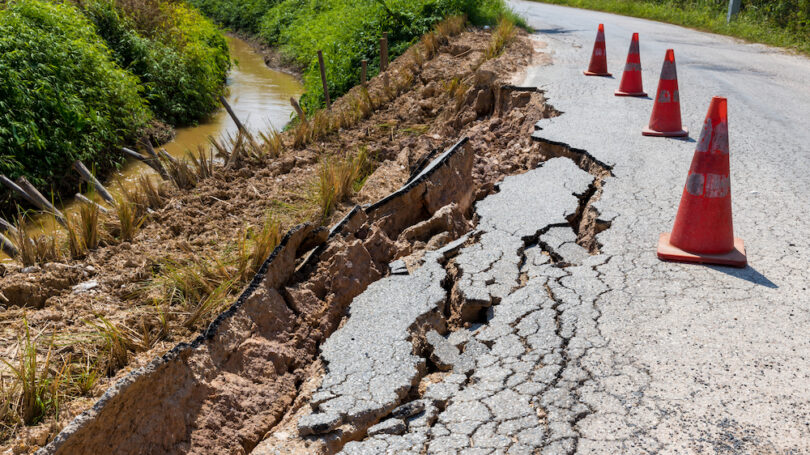To recognize the start of National Preparedness Month and the peak of the Atlantic hurricane season, State Police Superintendent and Director of Emergency Management Patrick J. Callahan and Commissioner of Environmental Protection Shawn M. LaTourette today urged the public to practice responsible planning for before, during and after hurricanes and other extreme weather events that have become more frequent as a result of climate change.
“In an era where severe weather and climate change converge, hurricane preparedness isn’t just a choice, it’s our responsibility. Together, we must adapt, mitigate, and stand resilient to the changing tides, and ensure our future remains as resilient as our determination,” said Colonel Patrick J. Callahan. “Through proactive readiness, continued collaboration with our emergency management and technical partners, and a deeper understanding of severe weather, we can continue protecting lives, safeguarding our communities, and securing our future.”
“While the focus is on hurricanes during this time of the year, other intense weather events from tornadoes to wildfires to inland flash flooding and landslides have become more common as a result of climate change and we urge everyone to be diligent throughout the year by being as prepared as possible for these disasters,” said Commissioner LaTourette. “DEP climate scientists provide valuable insight into weather trends and help ensure the public can best keep themselves and their loved ones safe in light of increasingly unpredictable and extreme weather.”
Prepare for future weather emergencies by following these tips provided by the New Jersey Office of Emergency Management:
- Sign up for emergency alerts: Tune in, log-on, opt-in, ‘like’ or ‘follow’ local, county, state, and federal agencies for credible disaster-related information such as alerts, warnings, situational awareness updates, and where to find help. Additional information can be found at NJOEM’s Staying Informed webpage. Remember, the Atlantic hurricane season officially ends November 30, 2023.
- NJ Register Ready: Register Ready, New Jersey’s Special Needs Registry for Disasters, allows New Jersey residents with disabilities or access and functional needs and their families, friends and associates an opportunity to provide information to emergency response agencies. This helps emergency responders better plan to serve them in a disaster or other emergency if evacuations are ordered. The information collected here is confidential and will not be available to the public.
- Make a family go-bag: While gathering your emergency kit, consider packing a go-bag for your family. This can be a duffle bag or gym bag that is easily accessible so you can grab it and go in the event of an emergency evacuation order. These bags should include items such as prescription medication, food, water, extra clothing, and copies of important documents and phone numbers to get you through the first few critical days. For information on how to put a family emergency kit together, visit NJOEM’s Your Kit/Your Plan webpage.
- Make an emergency plan: Make plans with family and friends in case you’re not together when any type of emergency – natural, technological, or person-made – occurs. Discuss how you will contact each other, where you will meet and what you will do in different situations. Become familiar with your town’s evacuation routes. For information on how to put a family emergency plan together, visit NJOEM’s Your Kit/Your Plan webpage. Pets are family too. Be sure to include them in your emergency plans by visiting New Jersey’s Animal Emergency Response webpage.
- Make an emergency kit: Emergency kits will allow individuals and families to survive after a disaster for several days without access to food, water, or electricity. Emergency kits should include at least a three- to five-day supply of non-perishable food and water, prescription medications for up to two weeks if available, baby supplies, pet supplies and any additional items for special medical needs, such as an extra pair of eyeglasses and batteries for hearing aids. Be sure to include important phone numbers for doctors as well as car cell-phone chargers.
- Be prepared for a financial emergency: It is a good idea to start an emergency savings account for unexpected emergencies or disasters, and make sure you have cash available, as electronic payment processing systems may not be functional. Make sure you review all your insurance policies regularly and verify you have the proper amount of coverage. Don’t forget to protect important documents, such as passports, driver’s license, pet ownership papers or birth certificates, by storing them in a waterproof, fireproof container.
Prepare for increasing climate change-related risks by following these tips provided by the New Jersey Department of Environmental Protection:
- Understand your flood risk: The size and extent of flood-prone areas is expanding due to climate change-related impacts such as increasing rainfall intensities and sea-level rise. Areas that are not normally impacted by flooding may see significant flooding now or in the future. To help homeowners visualize the risk to their home, an online interactive mapping tool called the New Jersey Flood Indicator Tool shows indicators of potential flood risk on or near a property of interest.
- Purchase flood insurance: Avoid paying out-of-pocket for flood damages by purchasing flood insurance; most homeowners’ insurance does not cover flood damages. Homes within FEMA’s Special Flood Hazard Area(SFHA) are eligible for federal flood insurance through the National Flood Insurance Program if their municipality participates in the program. For some, obtaining private flood insurance may be warranted if a home is outside the SFHA but is experiencing, or may experience, significant flooding.
- Consider a buy-out: A home may experience repeated and severe flood damage, in this case, the homeowner may consider a buy-out to move to an area with a lower risk of flooding. DEP’s Blue Acresprogram provides relocation assistance to families whose homes are subject to repeated flooding and gives them the option to sell their flood-damaged or flood-prone property to the state. Any homeowner interested in selling their property may submit an application to Blue Acres via the application formon the Blue Acres website.
- Get Weather Ready: DEP’s Weather Ready webpage provides live weather information and maps, links to National Weather Service and NJOEM resources, and links to DEP programs that are typically involved in preparing for and responding to storm events.
- Prepare as a community: Resilience planning and disaster preparedness is most effective when the entire community is involved. Resilient NJ is the DEP’s flagship resilience planning program and has regular funding opportunities for regions and municipalities to receive technical assistance for resilience planning to benefit the whole community.







